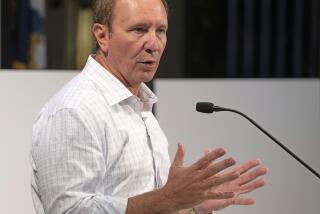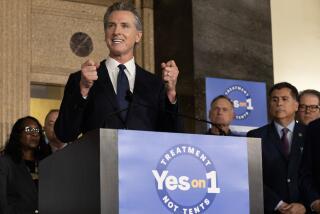Setbacks Aside, Gov. Bush May Yet Try to Become Next President Bush
- Share via
AUSTIN, Texas — George W. Bush, the most popular governor in recent Texas history, is limping a bit these days. And, oh yes, he’s just had surgery on his knee too.
Bush went under the knife 12 days ago to repair cartilage that popped in his left knee when he was jogging on New Year’s Day; sitting down for lunch at the governor’s mansion, he props his leg onto a chair and immediately covers it with an ice pack the size of a small dog.
What looks even more painful is the way the Texas Legislature has been operating on the heart of his agenda--his plan to cut property taxes and reconfigure the school finance system. With hardly a backward glance, the state House has set aside Bush’s blueprint and begun drafting its own.
None of this has been any fun for the governor. But it may not be quite as painful as it looks. His knee has already recovered to the point where he’s back on the Stairmaster. And by the time the Legislature adjourns in June, Bush is still likely to sign a property-tax cut that he can carry into a reelection campaign in 1998--and perhaps a bid two years after that to follow his father into the White House.
The governorship is the first public office Bush, 50, has held. Yet he is already laboring under the burden of great expectations. National Republicans laying down the early line on the 2000 presidential field always rate Bush near the top. His pedigree as the son of a former president partly explains that. But the buzz also reflects his success at advancing a forceful agenda at a time when the national GOP appears fractured and adrift.
Bush’s 70% approval rating with his state’s voters is among the highest for any governor. He has been able to bridge the GOP’s most daunting divide: Suburban moderates find him reasonable, while social conservatives praise his efforts to require parental notification for minors seeking abortions and to increase the role of churches in providing social services. He’s as popular among women as men.
After sweeping past Democratic incumbent Ann Richards to win the office in 1994, Bush soared through his first legislative session. Working closely with the Democratic legislative leadership, he passed all of his top priorities: welfare reform, juvenile justice reform, tort reform and a top-to-bottom rewrite of the state education code that radically decentralized power to local school districts. “It was like a hot knife through butter,” said William Miller, a leading Austin lobbyist.
This year, Bush looked for a crowning achievement with his plan to wean the state’s school finance system from its overreliance on local property taxes. He proposed to cut those taxes by about $3 billion annually, reducing the tab for the average homeowner by 40%. To fill the revenue hole, he proposed to raise the state sales tax, impose a broad new tax on business receipts and dedicate $1 billion from reduced spending. In one bold stroke, he hoped to mollify homeowners angry over rising property tax bills and provide a steadily growing source of revenue for schools buckling under rising enrollments.
But the plan landed in the Capitol with a resounding thud. Legislators weren’t keen on raising the sales tax. They were even less enthusiastic about replacing the state’s ancient franchise tax with Bush’s new tax on business receipts. Tom Pauken, the staunchly conservative state GOP chairman, publicly attacked the plan as a tax hike. Finally, Bob Bullock, the Democratic lieutenant governor and traditionally the most powerful man in state politics, officially pronounced the plan dead--at a ceremony rededicating the state cemetery, no less.
These reversals dented Bush’s halo. But he had generated enough momentum to keep the idea of property tax relief alive after his solution stalled. Now a special state House committee chaired by Democratic Rep. Paul Sadler--a shrewd baby boomer who joined with Bush to rewrite the education code--is drafting an even larger property tax cut, but paying for it mainly by extending the sales tax onto currently exempt activities such as legal services and auto repairs. Sadler may also have to trim his ambitions--interests defending their exemptions are mobilizing--but some form of property tax relief seems inevitable.
Amid this rather fundamental edit, Bush has been smart and confident enough to keep his cool. He understands that legislatures zealously guard their prerogative to shape tax bills, and he’s quietly encouraged Sadler, while preserving his options to critique the final product. “The key is to understand that this is a process,” Bush said. “I understand full well a successful plan will have a thousand authors. . . . If we can get everybody to think they have a piece of the action, it will be more likely to pass.”
Those sentiments show Bush at his best. He’s not a visionary, but he has become a disciplined politician who keeps his eye on the prize and his ego under control. He’s worked hard to build relationships across party lines, and it shows in the praise a Democrat like Sadler showers on him for confronting the school-financing problem before it became a crisis. “It is the essence of leadership to see a problem coming and say, ‘We’ve got to do something about it,’ ” Sadler said.
Whatever happens to the tax plan, Bush will head into 1998 as a strong favorite to become the first Texas governor to win reelection in 24 years. If that happens, the presidential speculation will become deafening. Bush, inevitably, brushes aside questions about his intentions; when an 11th-grade student asked him the other day whether he’ll run in 2000, he asked her whether she was worrying about the course load for her sophomore year in college. His message: Three years is a long time away.
That’s true. But the pre-presidential maneuvering in GOP circles has begun unusually early this time. Almost every day, some prominent Republican calls Karl Rove, Bush’s chief political strategist, offering to enlist for 2000 as soon as the governor gives the word. Rove commits to nothing. But he’s not throwing away any names either.
Ronald Brownstein’s column appears in this space every Monday.
More to Read
Get the L.A. Times Politics newsletter
Deeply reported insights into legislation, politics and policy from Sacramento, Washington and beyond. In your inbox twice per week.
You may occasionally receive promotional content from the Los Angeles Times.









